

Sidney L. Pressey (1888–1979) - University, Research, Psychology, and American - StateUniversity.com. Father of the teaching machine, author of the first book on standardized testing, and founder of the Division on Adult Development and Aging of the American Psychological Association, Sidney Leavitt Pressey was an innovator.
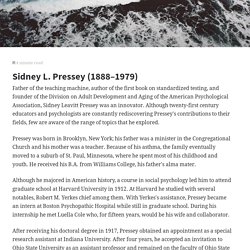
Although twenty-first century educators and psychologists are constantly rediscovering Pressey's contributions to their fields, few are aware of the range of topics that he explored. Pressey was born in Brooklyn, New York; his father was a minister in the Congregational Church and his mother was a teacher. Because of his asthma, the family eventually moved to a suburb of St. Paul, Minnesota, where he spent most of his childhood and youth. He received his B.A. from Williams College, his father's alma mater. Although he majored in American history, a course in social psychology led him to attend graduate school at Harvard University in 1912. Are teenagers in England addicted to social media? (And does it matter?) There have been lots of concerns raised recently about social media use among young people.
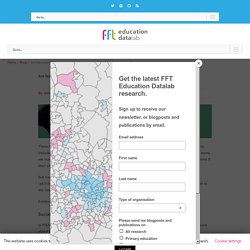
This includes links found between time spent on social media and declines in mental health. Similarly, some are now likening constant internet use to an addiction, with teenagers suffering withdrawal symptoms if their smartphone is taken away. But how frequently do young people in England access social media? The Cambridge Analytica scandal changed the world – but it didn't change Facebook. It can be hard to remember from down here, beneath the avalanche of words and promises and apologies and blogposts and manifestos that Facebook has unleashed upon us over the course of the past year, but when the Cambridge Analytica story broke one year ago, Mark Zuckerberg’s initial response was a long and deafening silence.
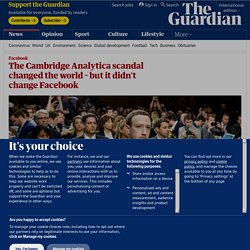
It took five full days for the founder and CEO of Facebook – the man with total control over the world’s largest communications platform – to emerge from his Menlo Park cloisters and address the public. When he finally did, he did so with gusto, taking a new set of talking points (“We have a responsibility to protect your data, and if we can’t then we don’t deserve to serve you”) on a seemingly unending roadshow, from his own Facebook page to the mainstream press to Congress and on to an oddly earnest discussion series he’s planning to subject us to at irregular intervals for the rest of 2019. How Cambridge Analytica Sparked the Great Privacy Awakening. The Age of Surveillance Capitalism. This video was recorded at the Institute of Art and Ideas' annual philosophy and music festival HowTheLightGetsIn.
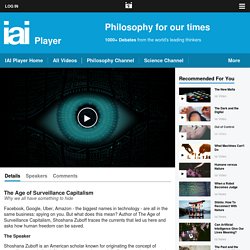
For more information and tickets, visit IAI TV videos are for personal use only. For commercial or educational licensing please contact the IAI. Is our relationship with digital technology true love or an unhealthy obsession? Technology is neither good nor bad, it is simply an amplifier of whatever we, as society and individuals, choose to use it for.
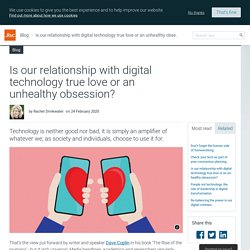
That’s the view put forward by writer and speaker Dave Coplin in his book ‘The Rise of the Humans’ - but it isn’t universal. Media headlines, academics and researchers regularly warn of the negative aspects of our relationship with technology. A disciplined approach. Hack Education. ‘Humane Tech or Capitalism Rebranded?’ With Moira Weigel and Ben Tarnoff. The tech industry’s promise to build less harmful products and programs is just capitalism’s way of proving that love means never having to say ‘I’m sorry’ Playing for Team Human today, recorded live on the floor at the Personal Democracy Forum 2018, are Moira Weigel and Ben Tarnoff.

Moira and Ben will be showing us how the tech industry’s promise to build less harmful products and programs is just capitalism’s way of proving that love means never having to say “I’m sorry.” Moira and Ben co-wrote the brilliant feature article in the Guardian, “Why Silicon Valley Can’t Fix Itself.” An Introduction to Connective Knowledge. Using holograms to train nurses: Pearson and Microsoft launch mixed-reality c...
An app that uses holograms of patients to train nurses is part of a new curriculum being launched by education company Pearson and Microsoft.

The firms have worked together to create a mixed-reality curriculum of six apps that use Microsoft’s HoloLens and other Windows headsets to immerse students in subject areas such as health, history, chemistry and maths. Rather than put users in a fully computer-generated world, as virtual reality does, HoloLens allows users to place 3D digital models in the room alongside them. As the Windows-10-based product does not have wires or external cameras, or require a phone or PC connection, users can walk around the objects they create and interact with them using gestures, gaze and voice. Maslow's Hierarchy of Needs. Bring your own device (BYOD) Rhizomatic – Dave’s Educational Blog. To the best of my knowledge, the term “MOOC” comes out of a skype chat conversation I had with George Siemens about what exactly he would call this thing he and Stephen Downes were doing so I could call it something for the ETT show were were planning on the subject.
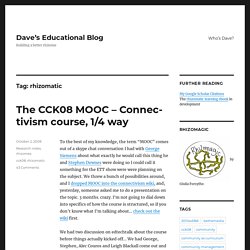
We threw a bunch of possibilities around, and I dropped MOOC into the connectivism wiki, and, yesterday, someone asked me to do a presentation on the topic. 3 months. crazy. I’m not going to dial down into specifics of how the course is structured, so if you don’t know what I’m talking about… check out the wiki first. We had two discussion on edtechtalk about the course before things actually kicked off… We had George, Stephen, Alec Couros and Leigh Blackall come out and share their opinions on the topic. Stephen and George as the course leaders and Alec and Leigh as two of the best thinkers on open courses that I know. The Daily and the blog. Community building I’m a bit of a community freak. Developing digital literacies. Digital literacies are those capabilities which fit an individual for living, learning and working in a digital society.
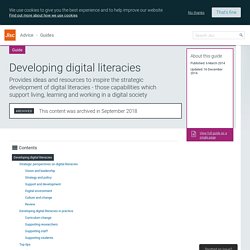
Digital literacy looks beyond functional IT skills to describe a richer set of digital behaviours, practices and identities. What it means to be digitally literate changes over time and across contexts, so digital literacies are essentially a set of academic and professional situated practices supported by diverse and changing technologies. This definition quoted above can be used as a starting point to explore what key digital literacies are in a particular context eg university, college, service, department, subject area or professional environment. Digital literacies encompasses a range of other capabilities represented here in a seven elements model: Digital literacy as a developmental process Defining digital literacy in your context Background.
The Age of Surveillance Capitalism (Zuboff 019) What Does the ‘Postdigital’ Mean for Education? Three Critical Perspectives on the Digital, with Implications for Educational Research and Practice. The principal contribution of this paper is to encourage conversation about what the ‘postdigital’ might mean for education.
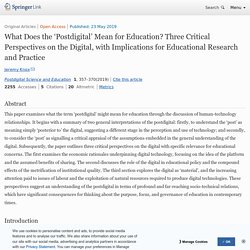
The intention is not to suggest decisive definitions, but rather to continue what is emerging as a productive speculation on future relationships between technology and the project of education. As will be elaborated further, the ‘digital’, and hence no less the ‘postdigital’, have tended to be fairly marginal concerns within a general project of education that has developed around humanism (Usher and Edwards 1994; Biesta 1998; Lewis and Kahn 2010). What s next for Ed Tech Critical hopes and concerns for the 2020s. Connective Knowledge 19May2012. The monsters of education technology. A Thousand Plateaus. History and Implementation of Classroom Technology - ScienceDirect. Bjet.12730. DfE Education Technology Strategy. 2012 01 12 computing in schools. Microsoft Word - VLE an evaluation of their development.doc - VLE an evaluation of their development.pdf. Essential_digital_skills_framework. A summary discussion of the use of learning technologies in FE V04 (2)
FELTAG-REPORT-FINAL.pdf. UK Digital Strategy. Education inspection framework (EIF) Skip to main content. CMR 2018 narrative report. Educational Research in Learning Technology. Education 4.0. Education 4.0 – transforming the future of education (through advanced technology) Future of the classroom emerging trends in k12 education. United Kingdom. The life changing magic of edtech – beyond the hyperbole. When we look at technology in education – or edtech - there is a risk that we fall victim to magical thinking and tech solutionism. From smart whiteboards to kids coding, it can feel like we are leaping into action because we can, without knowing why or what we’re looking to achieve. As HEPI director Nick Hillman says on the HEPI blog, nowhere is this more true than with hot button technologies like artificial intelligence (AI), blockchain and virtual reality.
For educators it can be instructive to ask what the real value of new product or service is to them. I would venture to suggest that this is very rarely in the technology itself. For example, does the fact that it “uses advanced AI techniques”, or “is built on the blockchain with smart contracts” at all relevant to the outcomes that it delivers? Education 4.0. Vision of Learning: A History of Classroom Projectors. Educators have been using projectors to integrate technology into classrooms since the late 1800s, and today’s projectors maintain the same basic purpose: transmitting images onto a surface. But that’s where the similarities between projectors from then and now end.
Projectors have evolved significantly in weight, technology and dimension since they were first introduced into classrooms. Here are five projectors that have helped students view learning in a whole new light: Late 1800s: The Magic Lantern Photo: Toy Theatre A Brief History: Magic lanterns projected images printed on glass slides. OpenAthens. About Us - SMART Technologies. Complete List - Top 10 Microsoft Moments. How acorn computers helped primary school children. Pinterest Explore more ideas with a Pinterest account Sign up to see more Continue with Facebook Continue with Google By continuing, you agree to Pinterest's Terms of Service, Privacy Policy Already a member?
Students need better preparation for digital careers, Jisc survey suggests. The results of the digital experience insights student survey 2019 explore how learners at UK universities and colleges engage with technology. Published today (3 September), the results of our digital experience insights student survey provides powerful data from 29,531 students on how they engage with technology. Data drawn from 13,389 further education (FE) students and 14,525 campus-based higher education (HE) respondents shows that only 40% in FE and 42% in HE feel their course prepares them for the digital workplace.